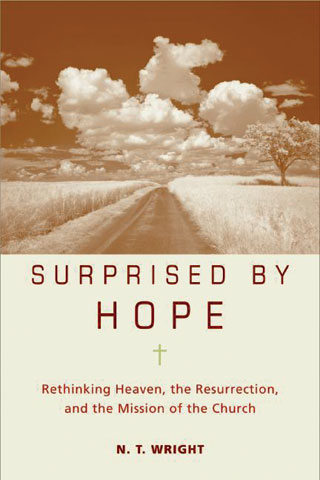 The Christian community is frequently confronted these days with media assertions that the Bible is unreliable, that an historical Jesus never existed and that his Resurrection is a Christian myth. In Surprised by Hope, internationally respected biblical scholar N.T. Wright not only ably defends Christian beliefs about the afterlife, he shows how our anticipation of the future life should affect our living today.
The Christian community is frequently confronted these days with media assertions that the Bible is unreliable, that an historical Jesus never existed and that his Resurrection is a Christian myth. In Surprised by Hope, internationally respected biblical scholar N.T. Wright not only ably defends Christian beliefs about the afterlife, he shows how our anticipation of the future life should affect our living today.
If Christians go to be “with Christ” when they die (see Philippians 1:23), what will that state of “bliss and refreshment” be like? How will it be different from the new Heaven and new Earth as described in Revelation 21-22? In speaking of our resurrection at the end of time, what did the Apostle Paul mean by the Christian's “spiritual body” (see 1 Corinthians 15:35-58)? These are questions that Surprised by Hope sets out to answer.
N.T. Wright affirms that while God's intent is to renew the whole creation (see Romans 8:18-25), this new world has, in fact, already begun in Jesus' bodily Resurrection and in his spiritually regenerated (“born again”) followers. The Church's mission is not only to “save souls” but to anticipate the end-time renewal by working for God's Kingdom today, bringing healing, hope and beauty.
In Salvation Army language, our mission is not only to lead people to a transforming friendship with Jesus Christ, but to co-operate with God in rescuing people from alcohol and drug addiction, reaching out to the homeless and destitute, battling against human sexual trafficking and other injustices. The resurrected Jesus has inaugurated God's new creation right in the middle of the old one!
I found Wright's perspective refreshing. Our engagement in this messy world, our participation in God's Kingdom work on Earth now, is also preparing us for our work and life in the new Heaven/new Earth (see Revelation 21:1). Holiness is the lifestyle that celebrates and embodies that new creation, a holiness characterized by self-giving love and forgiveness. Though affirming the end-time judgment, Wright suggests Hell will be a dehumanized existence in which people who persistently rejected Christ's saving grace cease to bear the image of God.
While this book is not punctuated with a lot of technical theological jargon, you will need to take your time in mining its nearly 300 pages of spiritual insights.









Leave a Comment